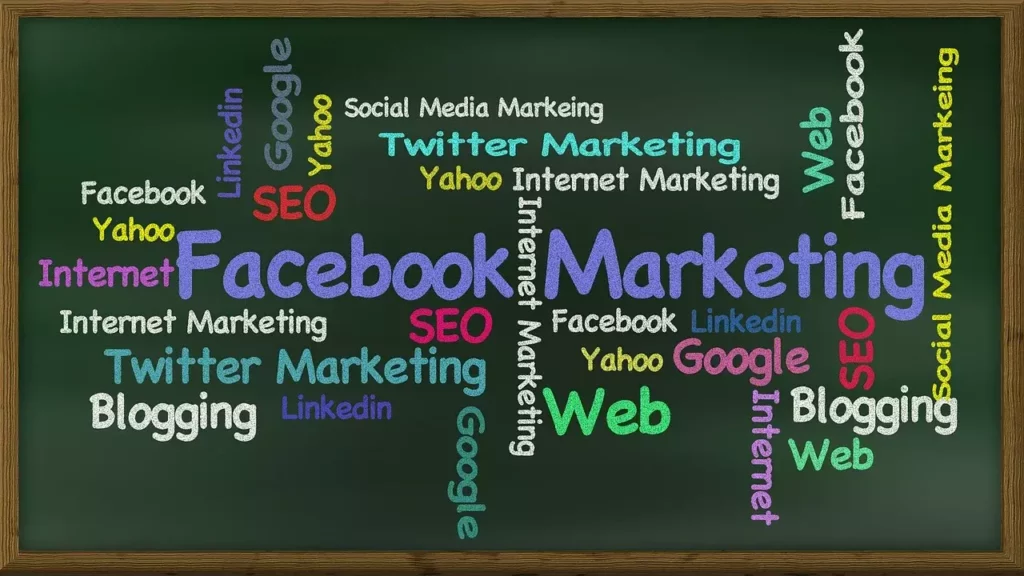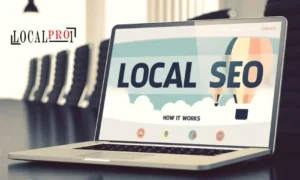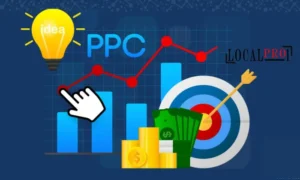Local SEO Services Near Me | Local Pro1 Welcome to...
Mastering Facebook SEO: Boosting Your Social Media Visibility
Mastering Facebook SEO: Boosting Your Social Media Visibility
Facebook SEO, also known as Facebook Search Engine Optimization, refers to the practice of optimizing your Facebook Page or content on the platform to improve its visibility and ranking in Facebook’s search results. While Facebook is primarily a social media platform, it has a powerful search feature that allows users to find specific Pages, profiles, groups, events, and posts. Local Pro1 will provide you the best services or the guidance related to the facebook Seo.

Understanding Facebook's Algorithm
EdgeRank was the original name for Facebook’s algorithm, although it’s no longer referred to as such. The concept of EdgeRank was used to explain how Facebook decides what content to show in a user’s News Feed. While Facebook has evolved its algorithm since then, understanding the basics of EdgeRank can still provide insights into how content is ranked and displayed.
EdgeRank consisted of three main components
Affinity Score: This measures the relationship between the user and the content creator. If a user frequently interacts with a specific friend or Page’s content, the affinity score between them increases, making it more likely that the user will see that content.
Weight: Different types of content carry different weights. For example, a comment or a like carries more weight than a simple click. Rich media like videos and images typically have higher weight than plain text updates.
Time Decay: Older content becomes less relevant. Facebook prefers to show recent updates rather than older ones, so time is a factor in the ranking.
Today, Facebook’s algorithm is more complex and takes into account a wider range of factors, but the idea that user engagement, content type, and recency influence what appears in the News Feed still holds.
Key Factors Influencing Facebook’s Algorithm
Content Relevance: Facebook’s algorithm prioritizes content that is likely to be relevant and interesting to the user. It assesses this relevance based on the user’s past behavior, such as what they’ve liked, commented on, and shared.
Engagement Metrics: Engagement metrics, such as likes, comments, shares, and clicks, play a significant role in determining the visibility of a post. Content that generates more engagement is more likely to be shown to a wider audience.
Timeliness of Posts: Facebook values fresh content. Recent posts are more likely to appear in users’ News Feeds compared to older ones. This encourages users to see current and up-to-date content.
How Facebook SEO Differs from Traditional SEO:
Facebook SEO services, often referred to as Social Media Optimization services (SMO), differs from traditional SEO in several ways:
Platform Focus: Traditional SEO is primarily concerned with optimizing content for search engines like Google. Facebook SEO, on the other hand, is about optimizing content for visibility within the Facebook platform, primarily in users’ News Feeds.
Content Types: While traditional SEO mainly involves text-based content and meta tags, Facebook SEO includes a broader range of content types, including text posts, images, videos, and live broadcasts.
Engagement Metrics: Facebook SEO places a strong emphasis on engagement metrics like likes, comments, and shares. High engagement is crucial for content visibility on Facebook, while traditional SEO relies more on factors like keywords, backlinks, and website structure.
Algorithm Dynamics: Facebook’s algorithm is more dynamic and personalized, taking into account a user’s behavior and preferences. In contrast, traditional SEO is more focused on ranking content in search engine results pages (SERPs) based on a set of predefined criteria.
Paid Promotion: Facebook also offers paid advertising options, such as sponsored posts and targeted ads, which can significantly impact content visibility. Traditional SEO doesn’t directly involve paid promotion within search engine results.
Facebook SEO Optimization
Optimizing your Facebook presence for search engines, also known as Facebook SEO optimization, can help improve your visibility in search engine results and attract more organic traffic to your Facebook Page.
On-Page Optimization
- Profile and Page Setup:
- Ensure that your Facebook Page is fully filled out with accurate and up-to-date information.
- Use a clear and concise profile picture and cover photo that represent your brand or business.
- Customize your vanity URL to include relevant keywords.
- Keyword Research for Facebook:
- Identify relevant keywords related to your niche, industry, or business.
- Use keyword research tools to discover popular and relevant keywords that people might use to find content similar to yours on Facebook.
- Optimizing Content for Keywords:
- Integrate selected keywords naturally into your Facebook posts, About section, and other relevant sections of your Page.
- Create high-quality, engaging content that resonates with your audience and incorporates your chosen keywords.
- Image and Video Optimization:
- Optimize images and videos by using descriptive file names, alt text, and captions that include relevant keywords.
- Use high-resolution and properly formatted media for better user experience.
Off-Page Optimization
- Building Quality Backlinks to Your Facebook Page:
- Share links to your Facebook Page on your website, blog, and other social media profiles.
- Encourage satisfied customers, partners, and influencers to link to your Facebook Page from their websites and social accounts.
- Social Signals and Their Impact:
- Engage actively with your audience by responding to comments, likes, and shares.
- Encourage users to interact with your content by asking questions, running polls, and hosting contests.
- Increased social engagement can indirectly boost your Facebook Page’s SEO by signaling its popularity and relevance.
Technical Optimization
- Optimizing Facebook Page Load Times:
- Ensure that your Facebook Page loads quickly by optimizing images and videos for web, using a content delivery network (CDN), and minimizing unnecessary scripts.
- Faster page load times improve user experience and can positively impact SEO rankings.
- Mobile-Friendliness and Responsive Design:
- Make sure your Facebook Page is mobile-responsive to cater to users on different devices.
- Mobile-friendliness is a crucial factor in search engine rankings, and Facebook heavily emphasizes mobile user experience.
- Schema Markup for Facebook Profiles:
- Implement schema markup on your website to provide search engines with structured data about your Facebook Page.
- Schema markup can enhance the visibility of your Page in search results and enable rich snippets, like star ratings and contact information.
Facebook SEO Strategy
Content Strategy
Content Calendar and Planning: Develop a content calendar that outlines what you’ll post on Facebook and when. Plan your content in advance to ensure consistency and alignment with your overall marketing goals.
Creating Shareable Content: Craft content that resonates with your target audience and encourages sharing. This could include informative articles, entertaining videos, eye-catching graphics, and engaging polls or quizzes.
Leveraging Facebook Live and Stories: Utilize Facebook Live to connect with your audience in real-time. Stories are a great way to share behind-the-scenes content, promotions, or quick updates. Ensure these formats are optimized for mobile viewing.
Audience Engagement
Increasing Post Reach and Engagement: To improve your reach and engagement, focus on creating content that sparks conversations and interactions. Ask questions, run polls, and encourage users to like, comment, and share your posts.
Running Facebook Contests and Giveaways: Contests and giveaways can boost engagement and grow your audience. Ensure your contests comply with Facebook’s guidelines, and use them strategically to promote your products or services.
Responding to Comments and Messages Promptly: Engage with your audience by promptly responding to comments and messages. Encourage meaningful conversations and address customer inquiries and concerns in a timely and helpful manner.
Facebook Insights and Analytics
Monitoring Performance Metrics: Regularly review Facebook Insights to track key metrics such as reach, engagement, click-through rates, and conversion rates. Understand which types of content perform best and identify trends over time.
Adjusting Strategies Based on Data: Use the insights you gather to refine your content strategy. If you notice that certain types of posts or posting times generate higher engagement, adjust your content calendar accordingly.
Tracking Competitors on Facebook: Keep an eye on your competitors’ Facebook pages. Analyze their content, engagement strategies, and audience demographics. This information can help you identify opportunities and stay competitive.
Facebook SEO Marketing
Paid Advertising on Facebook
Facebook Ads and their impact on SEO: While Facebook Ads don’t directly influence your website’s search engine rankings, they can indirectly contribute to SEO in several ways:
Increased Visibility: Running targeted Facebook Ads can increase your brand’s visibility and drive more traffic to your website. The more people visit your site, the better it can perform in search rankings.
Social Signals: Engagement on Facebook, such as likes, shares, and comments, can indirectly impact SEO. Search engines may consider these social signals as indicators of content quality and relevance.
Branding: A strong Facebook presence can help build brand authority, which can positively affect SEO. Brands with a strong online presence tend to perform better in search results.
Targeting options for SEO-focused campaigns: To run SEO-focused campaigns on Facebook, consider these targeting options:
Demographics: Target users based on age, gender, location, and other demographic factors to reach your ideal audience.
Interest-Based Targeting: Utilize Facebook’s vast data on users’ interests to reach people who are interested in topics related to your business.
Custom Audiences: Upload your customer email list to Facebook to target existing customers or create lookalike audiences to reach users similar to your current customers.
Behavior and Engagement: Target users based on their online behavior and engagement with your Facebook page or website.
Influencer Marketing:
Collaborating with influencers for SEO benefits: Influencer marketing on Facebook can provide SEO benefits by:
Content Promotion: Influencers can promote your content to their engaged audiences, increasing your content’s reach and potential for organic backlinks.
Social Signals: Influencers’ endorsements and shares can generate social signals, indirectly impacting SEO.
Brand Authority: Partnering with respected influencers can enhance your brand’s authority and trustworthiness in the eyes of both users and search engines.
Traffic and Engagement: Monitor website traffic and engagement metrics (click-through rates, likes, shares, comments) from influencer posts.
Backlinks: Measure any increase in organic backlinks to your site from influencer-promoted content.
Brand Mentions: Track mentions of your brand or products on social media, blogs, and websites.
ROI: Calculate the return on investment to determine if the influencer campaign was cost-effective.
Facebook SEO Tools and Resources:
Recommended SEO tools for Facebook: While Facebook itself doesn’t offer specific SEO tools, you can use various third-party SEO tools to optimize your Facebook presence and measure its impact on your website’s SEO. Some recommended tools include:
Google Analytics: To track website traffic and user behavior driven by Facebook.
SEMrush or Ahrefs: For competitor analysis and keyword research that can inform your Facebook content strategy.
Social Media Management Tools: Such as Hootsuite or Buffer, to schedule posts and monitor social engagement.
Facebook’s official resources for marketers: Facebook offers resources for marketers through its Business Hub, including guides, case studies, and best practices. You can also explore Facebook Blueprint, which provides free online courses on advertising and marketing on Facebook and Instagram.
Conclusion
Mastering Facebook SEO is essential for anyone looking to leverage the platform’s vast user base for marketing and engagement. By optimizing your content, profiles, and posts, you can improve your visibility and reach, ultimately driving more traffic and engagement. It’s crucial to stay updated with Facebook’s ever-evolving algorithms and best practices to maintain a competitive edge. Feel free to contact us for any type of query or the services related to Facebook SEO.
FAQs
What Is Facebook Seo?
Facebook SEO refers to the process of optimizing your Facebook presence to improve its visibility and ranking within Facebook’s search results. It involves using various strategies to make your Facebook Page, posts, and content more discoverable to users on the platform.
Why Is Facebook Seo Important?
Facebook SEO is important because it can help increase your brand’s visibility on Facebook, attract more followers, and drive organic traffic to your Page. It can also enhance your chances of reaching a wider audience and engaging with potential customers.
What Are Some Key Elements Of Facebook Seo?
Key elements of Facebook SEO include optimizing your Facebook Page name and description, using relevant keywords in your posts and captions, creating high-quality content, and engaging with your audience through comments and messages.
How Can I Optimize My Facebook Page For Seo?
To optimize your Facebook Page for SEO, make sure to include relevant keywords in your Page name and description. Fill out all the necessary information in the “About” section, use a profile picture and cover photo that reflect your brand, and ensure your Page is categorized correctly.
What Role Do Keywords Play In Facebook Seo?
Keywords play a crucial role in Facebook SEO. They help users find your content when they search on Facebook. Use relevant keywords in your posts, captions, and about section to improve your Page’s visibility.
Should I Focus On Organic Or Paid Facebook Seo?
Both organic and paid Facebook SEO strategies have their place. Organic SEO involves optimizing your Page and content for better visibility without paying for ads. Paid SEO includes running Facebook ads to reach a wider audience. A combination of both can be effective, depending on your goals and budget.
How can I improve the engagement of my Facebook Page for better SEO?
To improve engagement on your Facebook Page, post regularly, share high-quality and relevant content, interact with your audience through comments and messages, and encourage users to like, share
Our Services
Our Latest Posts
PPC White Label Services by Local Pro1 | Expert Solutions
PPC White Label Services by Local Pro1 | Expert Solutions...



